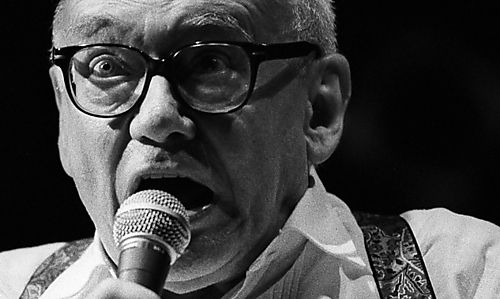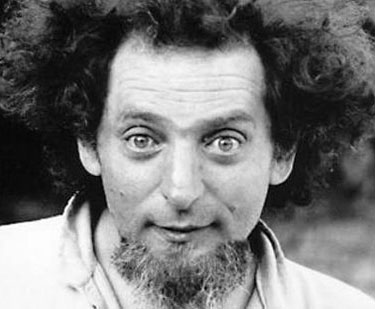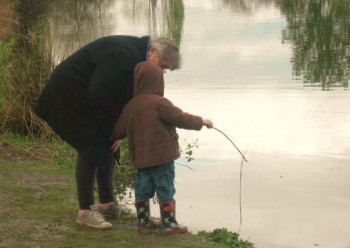This is the pleasure of Jandl’s Reft and Light. Not only does it introduce us to Jandl’s originals, it goes on to show us how any poet trying to wake up tired words can do so by putting an improvisational spin on them… What Jandl’s wordplay accomplishes in general is a toning up of the poetic muscles. Over the years it has provided me with several good workouts, and it has been a reminder that recess is part of the kinesthetic education of a poet, too. — Julie Larios
.
Ernst Jandl’s book Reft and Light opens with this word of warning from editor Rosemarie Waldrop: “Most of Ernst Jandl’s poems are so engrained in the German language that they are impossible to translate.” Notice that she doesn’t say “extremely difficult.” She says “impossible.” That doesn’t bode well for English-speaking readers who, like me, know only a few words in German – principally those used by fictional Nazis in old WWII movies – “Achtung! Verboten!” – or for readers who, also like me, have been puzzled by the long controversy over whether John Kennedy, in a 1963 speech, called himself a jelly donut or declared himself to be a citizen of Berlin (“Ich bin ein Berliner.”)
The jelly-donut controversy no doubt would have pleased Ernst Jandl, an Austrian poet and translator, whose work often explored the strange malleability of words. He was philosophically if not officially a member of the Oulipo school of experimental poets (the moniker “Oulipo” formed from the French words Ouvroir de Litterature Potentielle, meaning “Workshop of Potential Literature”) who played with formal constraints as a means of re-examining or re-awakening language. Inventive word-morphing, reconstructions, deconstructions and deliberately misdirected readings and soundings of words at the sentence, word and phoneme level – these were his strong suit, at least as far as Reft and Light is concerned. Waldrop’s note introducing the book helps explain why few people in the United States have heard of Jandl, despite his popularity among German-speaking readers. Reft and Light is one of only two collections translated into English (the other is Dingbat, translated by Michael Hamburger) and Jandl’s “poems” in this book are not lyrical in the traditional sense nor are they narrative. I’m not sure I would characterize most of them as poems; in fact, and I can’t recommend Jandl’s other work to you since I can’t speak German. Reft and Light is not likely to satisfy people looking for poetry with a capital P. But for people looking at language at the word level and taking pleasure in innovation and experimentation, reading the book is like spending recess on a school playground.
I was handed Jandl’s book several years ago by Christine Deavel of Seattle’s poetry-only bookstore, Open Books. “You’re the perfect reader for this,” she told me, and she was right. I’m a recess junkie when it comes to poetry, which is not to say I can’t go back to the classroom and enjoy the quieter lessons when recess is over. But I admit to liking the dizziness of a ride on the dangerous Big Spinner, word-wise, especially if it creaks and groans at unnerving intervals, and even more so if I feel like I might just be thrown off by the G-forces at work, heels over head and away. Jandl’s book is for punsters, anagramists, riddlers, jumble solvers, Scrabble players, crossword addicts, and poets who respond to sound as much as they do to images and ideas. You get off the ride and don’t quite know which end is up.
So if his work is untranslatable, as Waldrop states, how successful is Reft and Light? The entirety of her Editor’s Note tries to explain:
Most of Ernst Jandl’s poems are so engrained in the German language that they are impossible to translate. But their procedures can be imitated. Here is an experiment: several American poets respond to each poem so that original is encircled by multiple English analogues. The responses (which range from close imitations to freewheeling versions that continue Jandl’s thinking into other semantic areas) form the first part of this book. The version that seems closest to Jandl’s text is usually the first to follow the German.
Part II presents, in roughly chronological order, poems by Ernst Jandl either left in their original form (including visual poems and poems that he wrote in English) or translated/adapted by Anselm Hollo or myself.
The characterization of the translations as “analogues” is a good one: they are comparable, but not equal to. They are not literal translations. They are re-interpretations; they “continue Jandl’s thinking” and find ways to express his thought-process in English. Take this short experiment (again, not what I would call a poem) where Jandl turns a simple counting list inside out:
reihe
eis
zweig
dreist
vieh
füllf
ächz
silben
ach
neu
zinc
The correct German numbers 1-10 would be ein, zwei, drei, vier, funf, sechs, sieben, acht, neun, zehn. Translated literally, the title means “series” and Jandl’s list reads (if I’ve got it right) ice, twig, fresh, cattle, fill, groan, syllables, oh, new, zinc. We hear the similarities in the German pairing – ein/eis, sieben/silben, etc. But how to translate this into English when all the wordplay involves German sound variations? In Reft and Light, various poets try their best with a comparable English version of counting 1-10. The poet Keith Waldrop offers this basic possibility:
series
won
toot
treat
for
fife
sex
several
ate
nylon
tense
It’s a simple enough bit of play. I often asked my students at Vermont College of Fine Arts to give it a try, just to shake up the way they hear their own language (in the firm belief that we stop really hearing our own language because it’s too familiar – idiomatic speech is sometimes inaudible and metaphors are flattened by over-familiarity. Finding alternatives for the numbers is not hard. But if I asked my students to take it a step farther, to see if they could create a narrative of some kind out of the words, it became more difficult and more interesting. Here is an excerpt from Julie Patton’s extended variation on Jandl’s wordplay; her version incorporates both German and English equivalents and moves beyond sound imitation toward storytelling – it “sounds” like it could be counting from one to ten, but it’s not:
hide
wine
dry
for
fun
except
seepin’
out
‘nuf
said
Ray di Palma’s versions (five lists) even play with the title “series,” changing the title for each list to cherries, ceres, seers, jerries and cerise. This is the pleasure of Jandl’s Reft and Light. Not only does it introduce us to Jandl’s originals, it goes on to show us how any poet trying to wake up tired words can do so by putting an improvisational spin on them. In another example, “Otto Mops,” a univocalic, Jandl goes for the o’s to tie things together, sound-wise:
ottos mops trotzt
otto: fort mops fort
ottos mops hopst fort
otto: soso
otto holt koks
otto holt obst
otto horcht
otto: mops mops
otto hofft
ottos mops klopft
otto: komm mops komm
ottos mops kommt
ottos mops kotzt
otto: ogottogott
Okay: it’s not W.B. Yeats. But Jandl is not going for mystery and moonlight. He’s going for Abbot and Costello, in their classic skit, “Who’s on first?” He wants to make us sit up and make us notice how confusing and playful language is. With my meager German and a good dictionary, I can discern this loose story in the Otto poem: ottos pug defies / otto: away, pug, away / ottos pug hops away / otto: so so. // otto brings coke [can that be right?] / otto picks fruit / otto listens / otto: pug pug / otto hopes // ottos pug knocks / otto: come pug come / ottos pug comes / ottos pug throws up / otto: ohgodohgod.
Notice that the poem uses only the vowel “o.” And notice that the German words do more than rhyme, they morph in terms of sound: trotzt, fort, soso, koks, mops, obst, horcht, hofft, klopft, komm, kommt, kotzt, ogott. Elizabeth MacKiernan’s English version, below, uses only u’s and o’s, having changed Jandl’s o’s to ooh’s. Our Hero become Lulu rather than Otto – fair enough. MacKiernan loosely follows the narrative thrust of the original but her words rhyme a bit more, morph a bit less:
Lulu’s pooch droops
Lulu: scoot, pooch, scoot!
Lulu’s pooch soon scoots.
Lulu brooms room.
Lulu scoops food.
Lulu spoons roots.
Lulu croons: pooch, pooch.
Lulu broods.
Lulu’s pooch drools.
Lulu: poor fool pooch.
Lulu grooms pooch.
Lulu’s pooch poops.
Lulu: oops.
This play with vowels is typical of some of the best known work by Oulipo poets. The French writer Georges Perec made enough of a splash in 1969 with his 300-page lipogrammatic novel La disparition (in which the vowel “e” is never used) that a translation into English (The Void) was commissioned – the translator was Gilbert Adair. This was followed three years later by a companion novel, Les revenentes in which no vowels other than “e” are used (it was translated by Ian Monk in 1996 and given the title The Exeter Text: Jewels, Secrets, Sex.)
One of Jandl’s sound experiments is a little more haunting, less comedic; more zen, less Big Spinner:
canzone
ganz
ganz
……..ohne
völlig beraubt
canzone
ganz
ganz
……..ohne
völlig beraubt
Translated loosely, this says “all/ all / without // completely bereft // canzone // all / all / without // completely bereft.” Jandl arrives at this quiet moment by way of the original Italian word “canzone” (song, ballad) — to any German speaker, “canzone” sounds immediately like “ganz ohne,” which means “all without.” Gale Nelson offers up this English equivalent:
madrigal
sadly
sadly
………full
wholly undone
madrigal
sadly
sadly
……..full
wholly undone.
The English version doesn’t work quite as well because “sadly full” does not match “madrigal” quite as well as “canzone” matches “ganz ohne.” But it does continue Jandl’s thinking. Jandl also offers up a form which changes how we see the relationship between two words when a single letter gets replaced by another. He places the words on the page so their similarity is clear (this isn’t rocket science: it’s easy to imagine a good elementary school language arts teacher having her students do the same):
….o
fr sch
….i
In German, “frosh” means frog and “frisch” mean fresh. The Englsih translators do even better with this form:
…..i……………… is……………….o………………n…………..s
ch…mp || po…on || str..ng || bo y || .re . olve
….o………………. ti……………….i……………….d…………..v
Occasionally, the serious side of play shines through, as in this poem:
tee……….:….ein stück
:
lieber…..: tee
:
:
[egal]…..:
ich……….: tee
:
:
fragt……:
[er nie].:…tee
Craig Watson comes up with an excellent translation:
My…….:….T
:
liber…..:….tea
:
[fr]…….:
eterni…:….tee
:
[equ]….:
all a…….:….tease
Is this a poem? I think this one is. Are some of the other, simpler experiments poems? Not in my opinion. What Jandl’s wordplay in Reft and Light accomplishes in general is a toning up of the poetic muscles. I was grateful that Christine Deavel put the book into my hands. Over the years it has provided me with several good workouts, and it has been a reminder that recess is part of the kinesthetic education of a poet, too.
Here’s one last Jandl poem, written in English late in his life and cited in the obituary the New York Times published when he died:
When born again
I want to be
a tenor saxophone
if it’s up to me,
theres gonna be
total promiscuity.
Ernst Jandl was born in Vienna in 1925 and died there seventy-five years later; he was called up into the German army during World War II but was strongly anti-Nazi and criticized the Austrian government for its cooperation with Germany during the war. I can’t tell you whether the majority of Jandl’s untranslated work consists of poems that play less and paint more. I’m only familiar with Reft and Light, which might be the sorbet in between other courses of a more substantial meal, serving to cleanse the palette. I do know that Jandl was voted one of the ten most important German-language poets of the 20th century by a group of 50 writers, scholars and critics; the fact that he has next to no name-recognition in this country makes him qualify as undersung by any standard.
As an experimental poet, Jandl is not to everyone’s taste – experimentation, by definition, is not mainstream, and to honor sound at the expense of image and meaning is dangerous. But an old-fashioned playground is dangerous, too. At the very least, be brave, whether reader or writer or both: Climb up on the equipment and give it a spin. Try some of Jandl’s experiments: break up words, bend them. Above all, re-hear and re-fresh them. Meanwhile, keep the sound of that Abbot and Costello bit about “Who’s On First?” in your head. Why does that classic routine continue to appeal to us? Comedy is often located in miscommunication, and confusion makes us laugh, makes us wince, makes us listen more carefully and sends us new directions. Not a bad agenda for the creative spirit.
—Julie Larios
Julie Larios has contributed several Undersung essays to Numero Cinq over the last two years. She is the recipient of an Academy of American Poets Prize and a Pushcart Prize, and her work has been chosen twice for inclusion in The Best American Poetry series.



